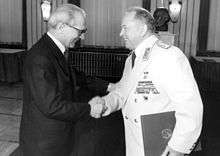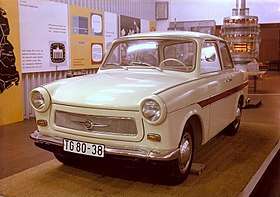East Germany jokes
East German jokes, jibes popular in the German Democratic Republic (GDR, also known as East Germany) between 1949 and 1990, reflected the concerns of East German citizen and residents. Jokes frequently targeted political figures such as Socialist Party General Secretary Erich Honecker or State Security Minister Erich Mielke, who headed the Stasi secret police.[1] Elements of daily life, such as economic scarcity, relations between GDR and the Soviet Union or Cold War rival United States were also common.[2] There were also ethnic jokes, highlighting differences of language or culture between Saxony and Central Germany.
Examples
Economic shortages
- What would happen if the desert became a socialist country? — Nothing for a while… then the sand becomes scarce.
- How can you use a banana as a compass? — Place a banana on the Berlin Wall. The bitten end would point East.
- A citizen orders a Trabant car. The salesman tells him to come back to pick it up in nine years. The customer asks: "Shall I come back in the morning or in the evening then?" — "You're joking, aren't you?" — "No, not at all. It's just that I need to know whether the plumber can come at 3pm or not."
Country and politics

Erich Honecker presents an award to Stasi chief Erich Mielke (1980)
- Which three great nations in the world begin with "U"? — USA, USSR, and our GDR. (German: Was sind die drei großen Nationen der Welt, beginnend mit "U"? USA, UdSSR, und unsere DDR. This alludes to how official discourse often used the phrase "our GDR", and also often exaggerated the GDR's world status.)
- A school teacher asks little Fritzie: "Fritzchen, why are you always speaking of our Soviet brothers? It's Soviet friends." — "Well, you can always choose your friends."
- Capitalism is the exploitation of man by man. What about Socialism? Under Socialism it is exactly the other way around. (German: Kapitalismus ist die Ausbeutung des Menschen durch den Menschen. Und wie ist es mit dem Sozialismus? Da ist es genau umgekehrt!)
Stasi
- How can you tell that the Stasi has bugged your apartment? — There's a new cabinet in it and a trailer with a generator in the street. (This is an allusion to the primitive state of East German microelectronics.)
- Honecker and Mielke are discussing their hobbies. Honecker: "I collect (German sammeln) all the jokes about me." Mielke: "Well we have almost the same hobby. I collect (German einsammeln, used figuratively like to garner) all those who tell jokes about you." (Compare with a similar Russian political joke.)
- Why do Stasi officers make such good taxi drivers? — You get in the car and they already know your name and where you live.
- Why do the Stasi work together in groups of three? — You need one who can read, one who can write, and a third to keep an eye on the two intellectuals.
Honecker

Soviet leader Leonid Brezhnev locked in a mouth-to-mouth kiss with Honecker
- Early in the morning, Honecker arrives at his office and opens his window. He greets the Sun, saying: "Good morning, dear Sun!" — "Good morning, dear Erich!" Honecker works, and then at noon he heads to the window and says: "Good day, dear Sun!" — "Good day, dear Erich!" In the evening, Erich calls it a day, and heads once more to the window, and says: "Good evening, dear Sun!" Hearing nothing, Honecker says again: "Good evening, dear Sun! What's the matter?" The sun retorts: "Kiss my arse. I'm in the West now!" (from the 2006 Oscar-winning movie The Lives of Others)
- What's the difference between Honecker and a telephone? — None! Hang up and try again. (This is a pun with the German words aufhängen und neuwählen, meaning both "hang up the phone and dial again" and "hang him and vote again".)
- Leonid Brezhnev is asked what his opinion of Honecker is: "Well, politically – I don't have much esteem for him. But – he definitely knows how to kiss!"
Trabant

Showcased Trabant 601 (1963)
- What's the best feature of a Trabant? — There's a heater at the back to keep your hands warm when you're pushing it.
- What does "601" stand for?" (in German, "601" is read as "six hundred and one")
- (original version) 600 people ordered cars, and only one has had it delivered.
- (variant from 1990) 600 cars on the dealership lot, and only one customer.
- (other variant) Space for 6 people, comfort for zero, and one to push it.
- How do you catch a Trabi? — Just stick chewing gum on the highway. (Allusion to the Trabant's underpowered motor.)
- What is the longest car on the market? — The Trabant, at 12 meters length. 2 meters of car, plus ten meters of smoke.
- A man driving a Trabant suddenly breaks his windshield wiper. Pulling into a service station, he hails a mechanic. 'Wipers for a Trabi?' he asks. The mechanic thinks about it for a few seconds and replies, 'Yes, sounds like a fair trade.'
Saxons
- The doorbell rings. The woman of the house goes to the door and quickly returns, looking rather startled: "Dieter! There's a man outside who just asks, Tatü tata?" (Tatü tata is onomatopoeia for the sound of a police car siren). Dieter goes to the door and comes back laughing. "It's my colleague from Saxony, asking s do Dieto da?" (standard German Ist der Dieter da?, i.e. "Is Dieter there?", in Saxon dialect)
See also
References
- ↑ Ben Lewis, Hammer and Tickle: A Cultural History of Communism, London: Pegasus, 2010
- ↑ Ben Lewis, "Hammer & tickle," Prospect Magazine, May 2006
Further reading
- Ben Lewis, Hammer and Tickle: A Cultural History of Communism, London: Pegasus, 2010
- Ben Lewis, "Hammer & tickle," Prospect Magazine, May 2006
- de Wroblewsky, Clement; Jost, Michael (1986). Wo wir sind ist vorn: der politische Witz in der DDR oder die verschiedenen Feinheiten bzw. Grobheiten einer echten Volkskunst [Where we are is the Front: The Political Joke in the GDR or the Subtlety and Cruelty of Genuine Folk Art] (in German). Rasch und Röhring. ISBN 3-89136-093-2.
- Franke, Ingolf (2003). Das grosse DDR-Witz.de-Buch: vom Volk, für das Volk [The Big Book of Jokes from DDR-Witz.de: By the People, for the People] (in German). WEVOS. ISBN 3-937547-00-2.
- Franke, Ingolf (2003). Das zweite grosse DDR-Witze.de Buch [The Second Big Book of Jokes from DDR-Witz.de] (in German). WEVOS. ISBN 3-937547-01-0.
- Rodden, John (2002). Repainting the Little Red Schoolhouse: A History of Eastern German Education, 1945-1995. Oxford University Press. ISBN 0-19-511244-X.
This article is issued from
Wikipedia.
The text is licensed under Creative Commons - Attribution - Sharealike.
Additional terms may apply for the media files.